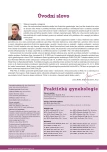-
Medical journals
- Career
Screening of disturbances of thyroid gland during pregnancy and postpartum
Authors: A. Kořenek
Authors‘ workplace: Jesenická nemocnice, spol. s r. o. ; Gynekologicko-porodnické oddělení
Published in: Prakt Gyn 2009; 13(3): 137-141
Overview
Aims:
The evaluation of thyroideal gland function during gravidity and after childbirth together with its dependence on iodine status in patients during early pregnancy, the level of thyroid-stimulating hormone (TSH), free thyroxin (fT4), thyroid antibodies against peroxidase (anti TPO) and thyreoglobulin (anti TG).Type of study:
Prospective longitudinal study.
Title and address of workplace:
Obstetrics and Gynecology Department, Jeseník Hospital. Methods: In the period between June 2005 and December 2006, 174 patients with a confirmed vital pregnancy (up to 10th week of pregnancy) were random included into the study. Iodine status was established based on the amount of iodine in the urine during 24 hours, the TSH, fT4, anti TPO and anti TG levels were determined from the blood using chemoluminescence. Blood samplings were done after a confirmation of vital pregnancy (I), in 20th week of pregnancy (II), four days after delivery (III) and six months after delivery (IV).Results:
165 of them completed study, seven patients used thyroxin before gravidity. The average ioduria value in patients was found to be 3.04 μmol/24 hours, none of the patients had a value lower than 0.6 μmol/24 hours. The 15 (9.1%) patients had levels of TSH (I) above 3 mIU/l (14 of them above 5 mIU/l), there are 8 (4.8%) patients in group IV, which levels of TSH were above 5 mIU/l. All patients had normal level of fT4 : 10.3–25 pmol/l. Five pregnancies ended in miscarriage by week 22, the other pregnancies concluded by delivery between weeks 38–41.Conclusions:
The results of our study did not demonstrate iodine insufficiency in any of patients, however 15 patients had elevated TSH levels (I), signaling subclinical or incipiently clinical hypothyroidism. There is alerting a elevation of level TSH (I) in 4 patients from 7 patients, which used euthyrox before pregnancy. Eight (4.8%) patients had levels of TSH (IV) higher than 5 mIU/l half year after delivery, what is confirming a subclinical postpartal hypothyroidism.Key words:
iodine – thyroid-stimulating hormone (TSH) – pregnancy – hypothyroidism
Sources
1. Maruna P. Gynekologické aspekty poruch štítné žlázy. Přehled. Čes Gynek 2006; 71(4): 332–338.
2. Pop VJ, Vulsma T. Maternal hypothyroxinaemia during (early) gestation. Lancet 2005; 365(9471): 1604–1606.
3. Rebuffat SA, Nguyen B, Robert B et al. Antithyroperoxidase antibody-dependent cytotoxicity in autoimmune thyroid disease. J Clin Endocrinol Metab 2008; 93(3): 929–934.
4. Dosiou C, Sanders GD, Araki SS et al. Screening pregnant women for autoimmune thyroid disease: a cost‑effectiveness analysis. Eur J Endocrinol 2008; 158(6): 841–851.
5. Límanová Z, Potluková E. Význam preventivního vyšetření funkce štítné žlázy v graviditě. Prakt Gyn 2007; 11(3): 120–124.
6. Soldin OP. Thyroid Function Testing in Pregnancy and Thyroid Disease: trimester-specific reference intervals. The Drug Monit 2006; 28(1): 8–11.
7. Casey BM. Subclinical Hypothyroidism and Pregnancy. Obstet Gynecol Surv 2006; 61(6): 415–420.
8. Nanda N, Bobby Z, Hamide A. Association of thyroid stimulating hormone and coronary lipid risk factors with lipid peroxidation in hypothyroidism. Clin Chem Lab Med 2008; 46(5): 674–679.
9. Kohn L, Hari N. Thyrotropin Receptor Autoantibodies (TSHRAbs): Epitopes, Origin and Clinical Significance. Autoimmunity 2003; 36 : 331–337.
10. Glinoer D, Delange F. The potential repercussions of maternal, fetal and neonatal hypothyroxinemia on the progeny. Thyroid 2000; 10(10): 871–887.
11. Matalon S, Sheiner E, Levy A. Relationship of treated maternal hypothyroidism and perinatal outcome. J Reprod Med 2006; 51(1): 56–63.
12. Morreale de Escobar G. Maternal hypothyroxinemia versus hypothyroidism and potential neurodevelopment. Alterations of her offspring. Ann Endocrinol (Paris) 2003; 64(1): 51–52.
13. Glinoer D. Management of hypo ‑ and hyperthyroidism during pregnancy. Growth Horm IGF Res 2003; 13(Suppl A): S45–S54.
14. Ayala A, Wartofsky L. The case for more aggressive screening and treatment of mild thyroid failure. Cleve Clin J Med 2002; 69(6): 313–320.
15. Soldin OP, Tractenberg RE, Hollowell JG et al. Trimester-specific changes in maternal thyroid hormone, thyrotropin, and thyroglobulin concentrations during gestation: trends and associations across trimesters in iodine sufficiency. Thyroid 2004; 14(12): 1084–1090.
16. Wier FA, Farley CL. Clinical Controversies in Screening Women for Thyroid Disorders During Pregnancy. J Midwifery Womens Health 2006; 51(3): 152–158.
17. Bjørn O, Åsvold M, Trine B et al. Tobacco Smoking and Thyroid Function. Arch Intern Med 2007; 167 : 1428–1432.
Labels
Paediatric gynaecology Gynaecology and obstetrics Reproduction medicine
Article was published inPractical Gynecology

2009 Issue 3-
All articles in this issue
- Are the caesarian section and birthweight associated with alergies?
- Screening of disturbances of thyroid gland during pregnancy and postpartum
- Malignant tumors of vulva
- Lichen sclerosus.
- Lymfoedema of the upper extremity after breast cancer therapy.
- Antichlamydial antibodies occurrence in men and women.
- Forensic aspects of assisted reproduction within the legislation context of the Czech and Slovak Republics.
- Practical Gynecology
- Journal archive
- Current issue
- Online only
- About the journal
Most read in this issue- Lichen sclerosus.
- Malignant tumors of vulva
- Screening of disturbances of thyroid gland during pregnancy and postpartum
- Forensic aspects of assisted reproduction within the legislation context of the Czech and Slovak Republics.
Login#ADS_BOTTOM_SCRIPTS#Forgotten passwordEnter the email address that you registered with. We will send you instructions on how to set a new password.
- Career

